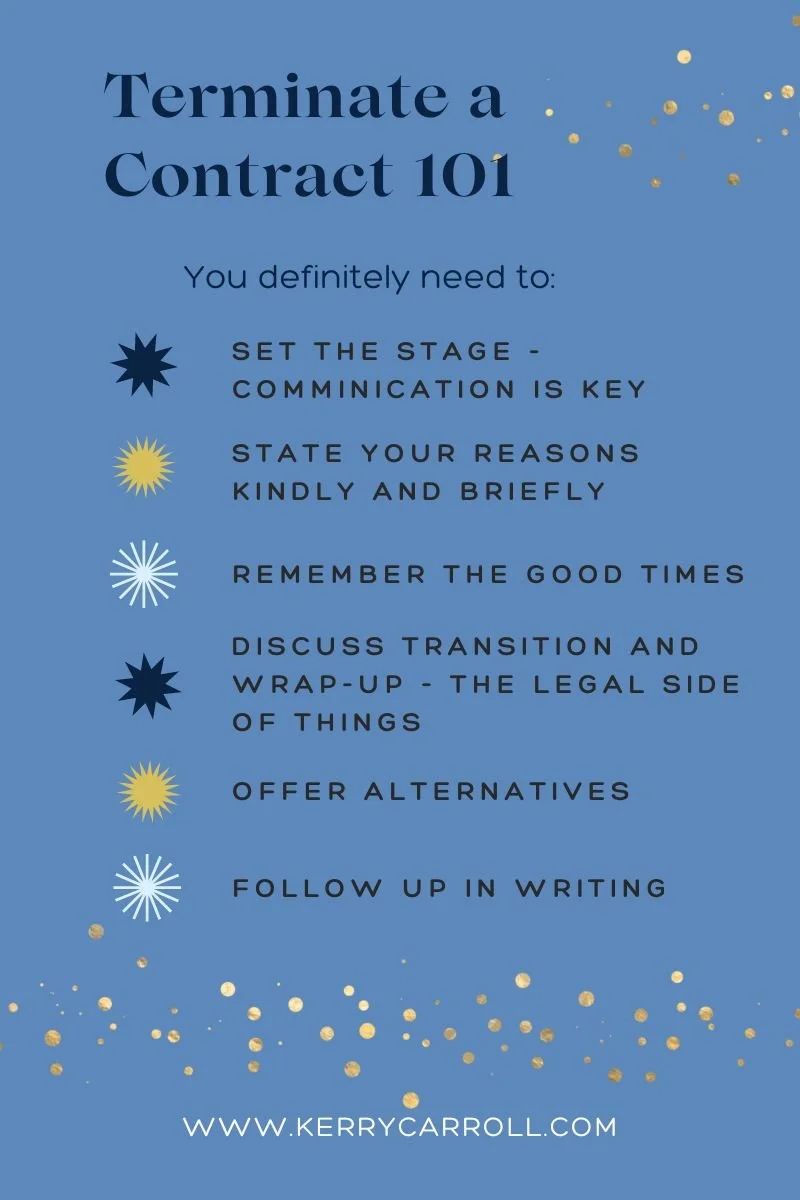How to Terminate a Client Contract and End on a Positive Note: A Guide to Navigating a Client Break up
Hi there, dreamers & dynamos,
Welcome to Breaking Up 101.
Hey there, dreamers and dynamos! We've all been there – the moment when you realize that continuing a business relationship with a client just isn't in the cards anymore. It's one of those moments when you're navigating the choppy waters of the business world, and trust us, you're not alone. Sometimes, for the sake of your sanity and your business's growth, you need to learn how to gracefully and legally terminate a client contract and the relationship with the client. And guess what? I've got your back, every step of the way.
The Intro: Breaking Up with a Client, It's Not You, It's Business
Picture this: you're building your business empire, piece by piece, and you've been working with a client for a while. But somehow, the synergy just isn't there anymore. Whether it's a clash of expectations, a shift in priorities, or you're simply outgrowing the relationship, it's time to have the talk – the one about terminating a client contract.
Before we talk about how to terminate a client contract, let's talk about how not to do it.
Don't ghost them, You've signed a contract and have legal responsibilities. Ghosting would be considered intentionally not honoring the contract aka breach. This would mean that the non-breaching party, in this scenario - the client. would be entitled to legal remedies which might include monetary damages.
Plus, intentionally breaking the contract without a really good reason is not going to do your biz or your reputation any favors. But good news, you don't have to resort to the Irish Goodbye, there are better and more legally supported ways to terminate a contract.
Before you ask, sending a "it's not you, it's me" text isn't going to be a winning strategy either.
So, how do you terminate a client contract? With empathy, professionalism, and a clear plan.
Buckle up, because we're diving into the art of breaking up with a client while maintaining your reputation and integrity.
Step 1: Set the Stage – Communication is Key
Hey, I get it. It's nerve-wracking to initiate a conversation about ending a business relationship and admitting that you want to terminate a client contract is scary. But remember, it's all about communication.
Start by scheduling a call or sending an email (whichever aligns with your usual communication style) to discuss your intentions. State the big idea upfront: You're looking to terminate the client contract as of a certain date.
Step 2: State Your Reasons, Kindly and Briefly
Just like a good breakup, honesty is crucial. Spell out the reasons you've arrived at this decision. Keep it succinct and to the point. Maybe you've shifted your business focus, or you've got an overflowing plate. Whatever the reasons, ensure you communicate them respectfully, and avoid making it personal.
If it is personal (they're a nightmare client and make constant unreasonable demands), it's best to just say that the relationship doesn't feel like a good fit and that someone else is going to be able to serve them better.
The decision to terminate a client contract isn't one that you made lightly, you're a passionate business owner who loves what you do, you have reasons. Spell them out respectfully.
Step 3: Remember the Good Times
While you're discussing the end, remember the positive moments you've shared with the client. Acknowledge their contributions and express gratitude for the opportunity to work together. A little nostalgia can go a long way in maintaining a respectful tone during this conversation. Celebrate their wins and highlight their progress.
Step 4: Discuss Transition and Wrap-Up
Ease the transition by discussing how you plan to wrap things up. Do you have any ongoing commitments? Will you be handing over any materials or files? Setting clear expectations for the transition helps both parties move forward smoothly.
This is also when you need to discuss if any payments are due for services rendered, if future payments will be cancelled, and if they are owed any refunds. You should prepare by referring your contract and making sure they received what they paid for, if not, a refund is likely in order.
Step 5: The Legal Side of Things
Legal matters might not be the most exciting part, but they're essential. If you've got a contract in place, review the termination clause (your contract does have one, right? Right?! If not, check out my template shop). An attorney drafted contract should lay out exactly how to terminate a client contract. Ensure you're following the stipulated process while ending the relationship. This not only protects your interests but also upholds your professionalism.
Step 6: Offer Alternatives
Sometimes, you might be ending the relationship because your services no longer align with their needs. In that case, be a true problem-solver. Offer alternatives – perhaps recommending another service provider who's a better fit. This approach showcases your commitment to their success even after the end of your collaboration.
Step 7: Follow Up in Writing
After the initial conversation, follow up with a written confirmation of the decision and its details. This provides clarity and ensures everyone is on the same page moving forward. A simple email outlining the discussed points may suffice but it's more professional to use a termination or cancellation of contract agreement that clearly spells out the final and complete terms of the cancellation. If that's not going to work for you, hiring an attorney to write a formal termination letter is a really savvy idea. Verbal cancellation leaves your business in vulnerable spot no matter how well the conversation went.
Step 8: Reflect and Learn
Ending a business relationship isn't just about the client. It's an opportunity for you to reflect and learn. What worked? What could have been improved? Use this experience to refine your business practices and enhance your future client relationships. Getting the right client from the start is so important and mitigates the need for these awkward conversation. Consider using a serious of pre-qualifying emails, phone calls, or an application so you can truly determine if this client will be a good fit for you.
How can my client contract help me avoid having to terminate a contract down the line?
I mentioned including a termination clause earlier in this article but there is so much more that you can do before you enter into the relationship.
What should my contract include to help avoid a sticky termination situation?
First, be sure to thoroughly review your contract. Does it contain sufficient detail to make the terms of your product or service clear? This should include not only the services you provides but the how, when, any deliverables, schedule, and investment or fee.
It should also contain clear communication expectations to set boundaries for client communication.
The all important termination clause
If it has all that, let's check out the termination clause. Usually, to be enforceable, the termination clause should be neutral meaning that applies equally to both parties. It will give each party the ability to end the contract and spell out exactly what procedures need to be followed. It definitely needs to include language addressing outstanding payment for services rendered, cancellation of future payments, or if any refunds will be provided.
The Wrap-Up: Remember, It's Not a Goodbye
Breaking up with a client isn't the end of the world – it's a chance for growth. Just like in any relationship, both parties need to be on the same page for it to flourish. By handling client breakups professionally and empathetically, you're not just preserving your reputation, but also fostering a sense of respect in the business community.
So there you have it, dreamers and dynamos! Breaking up with a client isn't easy, but with the right approach, it can be a positive step forward for both parties. Remember, it's not about burning bridges; it's about navigating the waves of business with grace and professionalism.
Ready to take the plunge? Share your thoughts on client breakups below and let's dive into the discussion together! 🌟
THIS ARTICLE IS NOT A SUBSTITUTE FOR LEGAL ADVICE AND IS OFFERED FOR INFORMATIONAL PURPOSES ONLY. EVERY SITUATION IS UNIQUE AND YOU SHOULD CONSULT A LOCAL ATTORNEY FOR ADVICE ON YOUR PARTICULAR CIRCUMSTANCES.



Hi, I’m Kerry, the only legal educator and template guru with a law degree from Columbia Law School in my back-pocket (and an Irish Wolfhound under my desk).
I believe businesses should have strong legal foundations and that their founders shouldn’t have to choose among complete overwhelm, sky-high prices, and copy&pasted legal docs. In my world, entrepreneurs get to focus on their creative gifts and growing profits, all while sleeping the sound sleep of CEOs who TCB (A little Aretha is always a good thing).
Get me free Legal Foundations Audit here